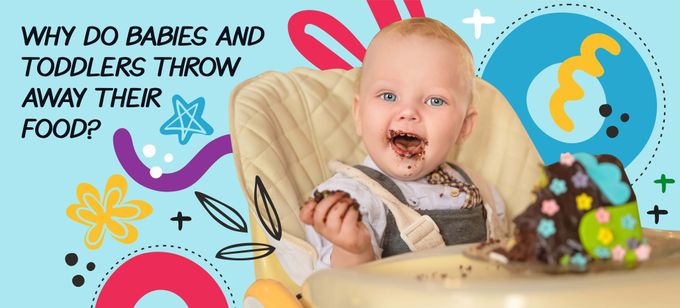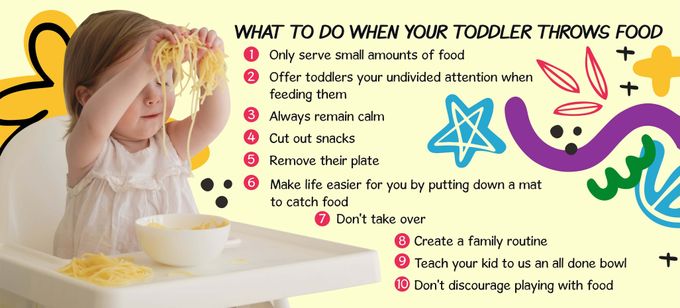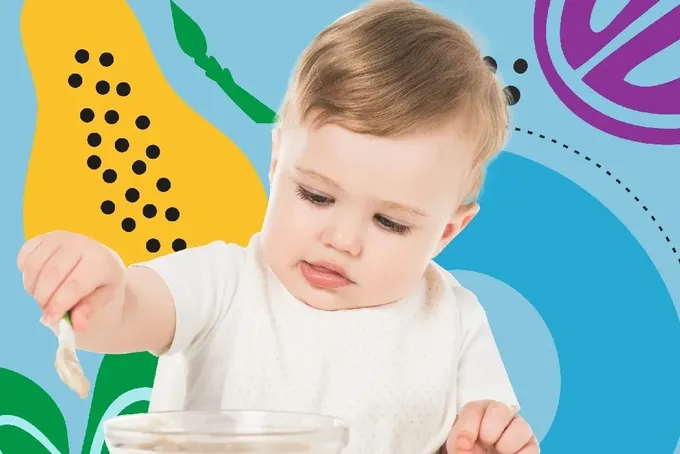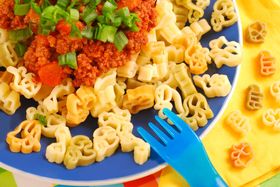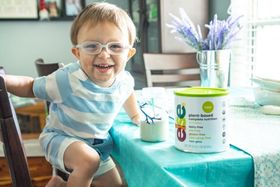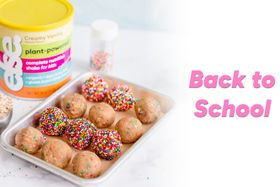Easy Tips to Stop a Baby from Throwing Food
Struggling with a toddler who throws food? Discover effective strategies to manage mealtime chaos while fostering a positive eating environment for your little one
Updated August 6, 2024
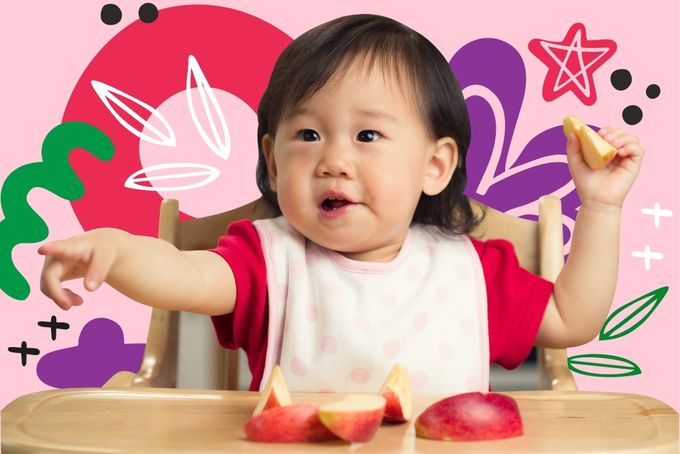
When babies learn to eat on their own, you can expect all kinds of projectiles to be hitting those around them. But even though throwing food may be funny the first couple of times, you'll find it cleaning less and less funny as the days pass. So, how can you make your little one understand that food is made for eating, not for throwing across the room? We put together a guide to help you deal with babies or toddlers throwing food.
» Discover nutritious plant-based formulas and encourage healthy eating habits
Why Do Babies and Toddlers Throw Away Their Food?
The first thing you need to understand is that babies and toddlers don't throw food on the ground to annoy their parents. As they learn to eat on their own, it's normal for babies to have a period of adaptation as they perfect their new skills.
» Understand why your baby is spitting out food
As parents will quickly notice, babies love to learn through play. What may seem like a terrible mess to you is a work of art of colors and textures for them. Throwing food is normal for babies and toddlers between 8 and 18 months old, so there’s really nothing to worry about.
There are actually multiple reasons for babies throwing food. Here are the most common of them:
- They are still learning cause and effect. Babies find it funny to see that throwing food on the floor or at someone makes something happen. For example, they may find out that throwing food at the dog makes the family pet come running to gobble it up, which could be an endless source of fun for them.
- They want to communicate. It doesn't take a lot for babies to understand that throwing food is a very good way to communicate that they don't want to eat something. Whether it's because they don't like it or because they're already full, babies will let you know they're not into it by throwing the food.
- They are afraid of being forced to eat it. It's never a good idea to force a toddler to eat their food because this may result in a fear of being forced. Children who have been forced to eat are likely to start throwing away all the food instantly as a defense mechanism.
- It's their way of getting attention. Babies and toddlers can learn quickly that you're going to give them a big reaction every time they start throwing food, so they may do it to get your attention.
» Here's how to create a balanced diet for your little ones
Although this is a completely normal phase, it can be unpleasant for parents. In addition to having to collect food from the floor at all meals, you may also be concerned that your baby is not getting enough food. Fortunately, there are multiple ways to limit the damage and teach your little one how to eat properly without throwing food at every meal.
» Make mealtime fun and nutritious with delicious plant-powered formulas
What to Do When Your Toddler Throws Food: 10 Tips for Stress-Free Mealtime
No matter the reason your little one is throwing food, here are some ideas on how to handle their behavior while remaining sane during mealtimes.
1. Only Serve Small Amounts of Food
Even though it may look like your toddler isn't eating enough because they play with their food and keep throwing it everywhere, most of the time, they are actually eating enough. Try to only offer them a couple of pieces of food at a time. If they don't have enough food on their tray, they will be less likely to throw it. It goes without saying that offering toddlers big helpings of food only gives them more ammunition.
» Discover nutritious and healthy food ideas for your toddler
2. Offer Toddlers Your Undivided Attention
As a parent, you have hundreds of things on your mind, and it's not unheard of to try to clean the kitchen or unload the dishwasher during mealtimes. While multitasking is great, your little one might be very tempted to play with the food and throw it to catch your attention. Sit down with your toddler whenever possible and give them your full attention. This won't necessarily stop them from playing with the food or throwing it, but at least you'll be able to stop them from making a big mess.
» Understand how to teach your baby to chew
3. Always Remain Calm
It's understandable that you may be annoyed by your toddler throwing food all over the place, but try to give them the illusion of calm, even if you're not. Remaining as calm as possible is particularly important when kids have the annoying habit of throwing food just to get your attention. If your little one senses that their habit sends you over the edge, they'll continue to do it.
» Explore easy and nutritious lunch ideas for toddlers
4. Cut Out Snacks
One of the main reasons babies and toddlers play with food is because they're already full. To prevent this from happening, it's always a good idea to cut down on snacks between mealtimes and only offer your little one planned snacks and drinks. If kids are actually hungry at mealtimes, they'll sit down and eat, and they'll be less likely to have tantrums and throw their food.
» Here's how to create a feeding schedule for your one-year-old
5. Remove Their Plate
If your little one continues to throw food and refuses to eat, remove their plate. Don't worry about them not eating enough; they're probably not too hungry anyway, and they need to learn that there are consequences to their actions.
It's important to remember that babies are intuitive eaters. This means they know how much food they need and when to stop. Trust their instincts and avoid pressuring them to eat more. By offering them at least five eating opportunities every day with lots of variety, you can rest assured that they are meeting their nutritional needs.
6. Use a Mat to Catch Food
Being prepared for the mess a toddler makes while they experiment with food is great for your own sanity, particularly if you're someone who's easily annoyed by the idea of a messy kitchen or dining room. Place a washable mat under the high chair so you don't have to spend too much time after each meal sweeping and mopping.
» Here's how to know when the time has come to start finger foods
7. Don't Take Over
Many parents become exasperated by their little one's habit of throwing food, and they try to minimize the mess by taking over the feeding so the kitchen or dining room remains tidy. This is not a good idea, though, as the more you feed a child yourself, the more you're prolonging the time they spend experimenting with food and making messes. Kids need a lot of practice when it comes to handling food, so it's important to allow them to do it themselves.
» Explore quick & nutritious toddler breakfast ideas for hectic mornings
8. Create a Family Routine
Babies and toddlers love routines, and they also tend to behave when they know what to expect. In order to stop your little one from acting out at mealtimes, you should establish a family routine.
For example, you can play some music and sit down with them every time you offer them food. If you have a larger family, make sure everyone sits down for a meal instead of getting their food to eat in front of the TV or with their eyes glued on their smartphones.
» Discover more on what a toddler should eat
9. Teach Your Kid to Use an All-Done Bowl
Another idea that can help you deal with toddlers who are throwing food is to teach them to put the food they don't want to eat into a separate "all done" bowl. It may take a bit of practice, but eventually, your little one will understand that the food they don't want to eat goes in the bowl, not on the floor.
» These foods can help promote healthy weight gain in toddlers
10. Don't Discourage Playing with Food
If you encourage your little one to play with food while eating, this may discourage them from throwing it. For example, you can use mealtimes to teach your little ones how to eat various types of food while also playing. If they avoid one of the items on their plate, like zucchini circles, for example, you can teach them how to stack the circles. This will keep your toddler occupied and distract them from throwing food.
» Discover wholesome and delicious meals for 2-year-olds
What to Do if Nothing Works?
If you find that nothing works, the only thing left to do is ignore their behavior. Remember that your toddler is learning cause and effect, so they may find it very entertaining or at least intriguing to see you fussing about cleaning the food, making faces, or giving them a lecture.
The goal here is to make the entire experience as uninteresting as possible. If your little one does not get a reaction they can find entertaining, their interest in doing it again will fade considerably.
» Get expert tips on how to support your kid's immunity with nutrition
Creating a Positive Eating Experience
Babies and toddlers learn everything about the world around them by exploring. Playing with food and throwing it is all part of the learning experience, so it's really up to you to decide whether you're comfortable with that level of playing. It's essential to remain as calm as possible while also setting rules for your little one.
Try to be as consistent as possible regarding the rules you set. Keeping your eye on long-term results is always beneficial, so do your best to create a positive eating environment that's free of drama and punishment.
» Create positive eating habits with the right nutrition for healthy growth
The content and advice provided in this article are for informational purposes only and are not a substitute for medical diagnosis, treatment, or advice for specific medical conditions. Always consult a pediatrician to understand your child's individual needs.




